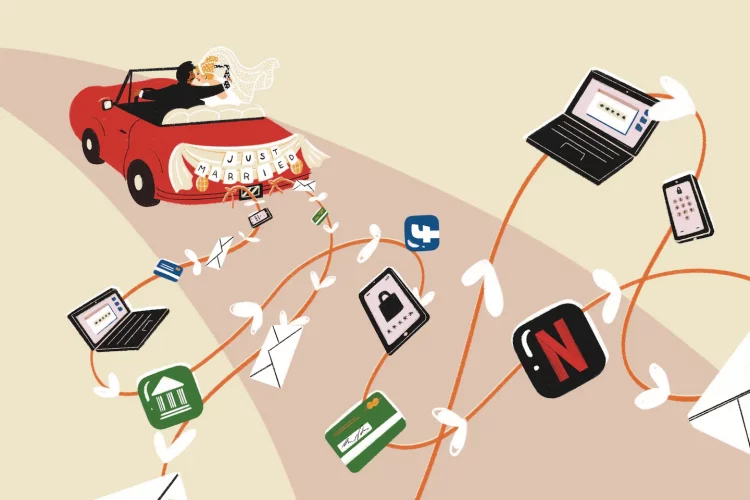Comment on this story
Comment
For 39-year-old David Koll, the decision to add himself to his new wife’s insurance account was simple — he’s a freelancer, she has a full-time gig. The choice was so easy, in fact, that the newlyweds decided to write down two lists of all their most important digital accounts and decide which they should combine.
There were nearly 60 entries: “Hewlett-Packard, Headspace, two Bank of America accounts,” Koll read from his list. “Somehow five different Apple accounts.”
Then came the deliberation. Koll’s older relatives tend to share family email addresses, but he would never want access to his wife’s messages, he said. To make things more complicated, some of Koll’s accounts, like Hulu, technically belong to an ex-girlfriend. Now that he’s married, using it feels “weird.”
Newlyweds don’t need extra challenges, but Koll is wading through one unique to today’s couples. The average online American has upward of 150 digital accounts, according to password-management company Dashlane. That’s a decades-long record of an autonomous life lived online. Deciding whether to combine accounts — and sometimes cut ties with previous account holders — is both a practical and philosophical quandary for the love-struck. Still, it’s worth making a game plan with your partner, says Erin Lowry, author of “Broke Millennial Talks Money: Scripts, Stories, and Advice to Navigate Awkward Financial Conversations.”
In some ways, creating joint accounts feels vulnerable, like erasing your own digital footprint, said Megan Fritts Cabrera, an assistant professor of philosophy at the University of Arkansas at Little Rock. So much could go wrong: Death, divorce, weird joint social media accounts. It’s a classic “prisoner’s dilemma,” she said.
“Loosely put, it’s where two or more people are stuck in a situation where if they decide to bet on trusting each other, then the outcome will be the best. But if one of them decides to bet on trusting the other and the other decides to bet on self-preservation, then the person who bet on trust is going to lose out.”
That may be especially true of accounts that come with contracts, like cell plans.
Cabrera, 31, and her husband, 32, combined most of their accounts, including banking. But years dealing with spotty reception in the Midwest taught them that two cell networks are better than one — they’re both still on their parents’ family cell plans.
Jeff Duong, 35, is on his parents’ plan, too. He’s open to leaving, but he imagines the shift will happen “organically.” (His parents will kick him off the plan, he clarified.) He’s already moved in with and gotten engaged to his boyfriend, Phil. But combining cellphone plans feels like a big step, he said.
“I imagine at some point after we get married, the expectation will be for me to switch to his account,” Duong said. “It’s like a symbol of me entering this next chapter of my life. I can’t be this uber-adolescent anymore. I have this partner. He has his own Verizon account.”
Some accounts, like streaming services, don’t come with scary multiyear contracts. But combining them comes with risks nonetheless.
Colleen McManus, a marketing professional in Los Angeles, got married in February. In their enthusiasm to combine and save money, she and her husband adopted the same Spotify account. It worked — until the bossa nova tracks on her “happy hour” playlist infiltrated the algorithm. Her husband started hearing syncopated samba beats while he sat in the car, exercised and worked from home.
“He was like, ‘I cannot do this anymore,’ ” McManus said.
For Cabrera and her husband, a combined Spotify was off the table from the get-go: She’s afraid her “guilty pleasure” tracks will pop up at unexpected moments. (She wouldn’t say on the record which songs are to blame.)
‘You do have to share some stuff’
Negotiating with a partner over shared finances or closet space is tough. But digital accounts can be even tougher because we don’t know what set of expectations we’re supposed to be negotiating from, said Cabrera, whose research focuses on technology and human agency.
Some people like Nina Rizzo, a program manager at a Bay Area nonprofit, take it upon themselves to develop criteria. When she’s deciding whether to combine an account with her soon-to-be husband, she said she uses three pillars: cost, coordination and utility. Will it save them money? Could they still coordinate effectively if the accounts are separate? And, perhaps most importantly, is changing the account a giant pain in the butt?
For instance: Rizzo briefly considered changing her last name, she said. Then she thought about how long it would take to rename her dozens of digital accounts.
For many baby boomer couples, separate online lives would be unthinkable, said Don Cole, a marriage therapist and clinical director at marriage research organization the Gottman Institute. But today — thanks in part to mid-century legal changes that allowed women to hold financial accounts in their own names — mashing together online identities feels at best a cost-saving chore, at worst a violation of autonomy.
Each partner will have a different threshold for autonomy and togetherness, Cole said. Successful couples are the ones who talk about those differences.
As in all marital conflicts, opinions on cell plans and streaming accounts say something deeper, he said. If one partner insists on having an accessible list of family passwords, that might speak to their need for security. If the other wants separate Amazon accounts, that might be because they value privacy. When conflict arises, brainstorm how you can meet each other’s foundational needs and support each other’s visions of a happy relationship, he advised.
There’s no tipping point where couples officially become “too separate” in their dealings, according to Cole. But the Gottman Institute’s decades of research into successful marriages has found that couples who make a habit of “turning toward” each other rather than “turning away” have a greater chance of staying together.
“You don’t have to share everything to be a family, but you do have to share some stuff,” he said.
If you’re trying to decide what to share, first assess your own accounts and make sure you’re not paying for anything you don’t actually use, personal-finance expert Lowry said. Once you’ve streamlined your list, sit down with your partner and see what you’ve doubled up on.
If combining an account would cause you “logistical or emotional pain,” keeping things separate may be worth the extra cost, she said. Two music lovers, for example, benefit from separate Spotify accounts.
The one nonnegotiable for Lowry? Passwords. It can be painful to talk about estate planning, she said, but if one partner dies, the other will need access to important digital accounts. Adopt some sort of password manager, choose beneficiaries and set up “transfer on death” designations for your primary accounts. Even Facebook has legacy contacts who can access accounts if the holder dies.
Whatever you decide, things could always evolve. When Duong first met Phil, he was skeptical of even sharing a Netflix, he said.
“With my track record with men, I did not want to be at risk of losing an account with shows and movies carefully curated to my tastes,” he said.
But over time, things changed. Phil’s collection of movies wasn’t too bad, Duong noticed. They kept separate profiles to buy or stream what they liked, but would often come together to watch. Now Phil chooses a movie every night, and they watch it as they fall asleep side by side.
“I trust his taste entirely,” Duong said.
Source by www.washingtonpost.com




























